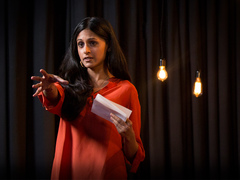
Parul Sehgal speaks on the nature of jealousy in the TED office. Photo: Ryan Lash
“When we feel jealous, we tell ourselves a story. We tell ourselves a story about other people’s lives,” says Parul Sehgal
 Parul Sehgal: An ode to envy
, an editor for The New York Times Book Review, in her TED Talk, a poetic meditation on an oft-resented emotion. “These stories make us feel terrible because they are designed to make us feel terrible. As the teller of the tale and the audience, we know just what details to include to dig that knife in. Jealousy makes us all amateur novelists.”
Parul Sehgal: An ode to envy
, an editor for The New York Times Book Review, in her TED Talk, a poetic meditation on an oft-resented emotion. “These stories make us feel terrible because they are designed to make us feel terrible. As the teller of the tale and the audience, we know just what details to include to dig that knife in. Jealousy makes us all amateur novelists.”
Indeed, jealousy turns us all into the weavers of emotionally grim tales. But as a life-long scholar of both jealousy and literature, I’d have to agree with Sehgal that the most jealous characters are often the most interesting. Here are my 9 most memorable moments in literature where characters act mad in the name of jealousy:
1. Marcel Proust, Remembrance of Things Past, translated by C. K. Scott Moncrieff and Terence Kilmartin
“It is not even necessary for that person to have attracted us, up till then, more than or even as much as others. All that was needed was that our predilection should become exclusive. And that condition is fulfilled when – in this moment of deprivation – the quest for the pleasures we enjoyed in his or her company is suddenly replaced by an anxious, torturing need, whose object is the person alone, an absurd, irrational need which the laws of this world make it impossible to satisfy and difficult to assuage – the insensate agonizing need to possess exclusively.”
Not long after this passage comes the famous scene, which Sehgal mentions in her talk, in which Swann sits at home after having just left his Odette. Suddenly, for no real reason, it occurs to him that maybe she’s gone to meet someone else. He leaves his house, gets in a cab, and stands outside her house. On a street full of dark houses hers is the only one with light coming from it, “between the slats of its shutters, closed like a wine-press over its mysterious golden juice.” He tiptoes up to the window to see who it is — he is tortured and hell-bent on finding the truth. And he sees … two old men. It’s the wrong house.
2. Henry James, The Spoils of Poynton
“No account whatever had been taken of her relation to her treasures, of the passion with which she had waited for them, worked for them, picked them over, made them worthy of each other and the house, watched them, loved them, lived with them. … Nothing so perverse could have been expected to happen as that the heir to the loveliest thing in England should be inspired to hand it over to a girl so exceptionally tainted.”
The Spoils of Poynton is a novel famously about chairs and lamps, and indeed the thrust of the plot is premised on possession of all kinds. Mrs. Gereth, the owner of the estate of Poynton, is deeply indignant that another woman — especially her son’s garish and unworthy fiancé — should come into possession of her estate and all the many fineries in it. Her jealousy is the impetus for her to goad Fleda Vetch, the protagonist, into trying to woo her son away from his fiancé.
3. Adolfo Bioy Casares, The Invention of Morel, translated by Ruth L. C. Simms
In Casares’ novella, an unnamed narrator finds himself on an island, where he falls in love with a woman he’s never met whose name is Faustine. He’s obsessed with her, but she won’t talk to him. Not for a lack of trying; the narrator discovers later that the island is an experiment by a scientist named Morel, who had invented a photography machine to capture his friends frozen into the same motions over and over again for eternity. Driven wild by the possibility that Faustine might be dallying with Morel, the narrator decides to hijack the machine to (appear to) be with Faustine forever by inserting himself into the permanent image of Faustine and the other captives on the island. In the closing pages of the novella, he reflects:
“I am obsessed by the hope of removing Morel’s image from the eternal week. I know that it is impossible, and yet as I write these lines I feel the same intense desire, and the same torment. The images’ dependence upon each other (especially that of Morel and Faustine) used to annoy me. Now it does not: because I know that, since I have entered that world, Faustine’s image cannot be eliminated without mine disappearing too.”
4. George Saunders, Tenth of December: Stories
One of my favorite renderings of sexual jealousy – or lack thereof – is in Saunders’ short story “Escape from Spiderhead.” The narrator, Jeff, is a prisoner who gets doped (and duped) into falling in love with two different women, with whom he has sex and professes to love equally. When he realizes he is part of the same triangle with another man, and each of the two women has had sex with the two of them (and yet another man), he is probed by the experimenters.
“Well, I feel a little jerked around,” I said.
“Do you feel jerked around because you still have feelings of love for one of the girls?” he said. “That would need to be noted. Anger? Possessiveness? Residual sexual longing?”
“No,” I said.
“You honestly don’t feel miffed that a girl for whom you felt love was then funked by two other guys, and, not only that, she then felt exactly the same quality/quantity of love for those guys as she had felt for you, or, in the case of Rachel, was about to feel for you, at the time that she funked Rogan? … Think deeply on this.”
I thought deeply on it.
“Nothing,” I said.
Saunders so wonderfully renders the dynamics of love and jealousy as chemical applications; once they are removed, the subject of the experiment no longer experiences sexual jealousy the way any normal person might if they found out the object of their professed love had just slept with someone else within hours.
5. Vladimir Nabokov, Lolita
In the latter half of the novel, Humbert Humbert’s devastation at having been robbed of Lolita, the young fire of his loins, leads him on a interstate chase and ultimately to an incredibly awkward shoot-out with Dr. Quilty. In the epic dual between them, Humbert has Quilty read his death sentence, which he has written in verse, aloud:
“because you stole her
from her wax-browed and dignified protector
spitting into his heavy-lidded eye
ripping his flavid toga and at dawn
leaving the hog to roll upon his new discomfort
the awfulness of love and violets
remorse despair while you
took a dull doll to pieces
and threw its head away
because of all you did
because of all I did not
you have to die”
6. Lydia Davis, The End of the Story
In a moment that echoes across pages and centuries, the narrator sits in her home and broods over the loss of her most recent lover, wondering where he is and who he’s with. She has to know the truth of what he’s doing, even if it means subjecting herself to the torture of her jealousy. One night she drives in the rain through the town where this former lover lives. She parks by his house and sees a figure that doesn’t seem like his in the window. Unable to see clearly through the darkness and rain, she goes up to the balcony. In a later scene, she drives slowly around town inching toward white cars she thinks are his until she realizes the license plate is different.
“If I couldn’t be with him and he wouldn’t talk to me, I at least wanted to know where he was. Sometimes I found him, though more often I did not. Even if I did not, I still preferred looking for him to sitting at home.”
7. Louisa May Alcott, Little Women
One of my favorite moments of jealousy in literature, simple and straight to the heart, is the moment in Little Women in which Amy, the youngest March sister, in a jealous rage that she has to stay home while her two eldest sisters go to the theater, burns her sister Jo’s manuscript while she’s out. What’s most chilling, though, is Jo’s reaction when she realizes her sister isn’t kidding:
“‘What! My little book I was so fond of, and worked over, and meant to finish before Father got home? Have you really burned it?’ said Jo, turning very pale, while her eyes kindled and her hands clutched Amy nervously.”
Like a punch to the gut.
8. Milan Kundera, The Unbearable Lightness of Being
In the early days of their marriage, Terez is quietly driven mad by Tomas’ infidelity:
“Before long, unfortunately, she began to be jealous herself, and Tomas saw her jealousy not as a Nobel Prize, but as a burden, a burden she would be saddled with until not long before his death.”
It is this obsession with Tomas’ alternate life that leads Terez to seek out a friendship with Sabina, Tomas’ lover. Her jealousy and her desire to see Tomas in his life with Sabina, indeed to even become Sabina in their alternate reality together, lead her to the novel’s unforgettable scene in which she photographs Sabina naked with just her grandfather’s hard black bowler hat.
9. Shakespeare, Othello
The handkerchief of mischief in Othello has become a symbol of the potential damage from one simple turn of jealousy. Iago, hell-bent on destroying Othello, convinces him (on some pretty shaky evidence) that his wife, Desdemona, is sleeping with Cassio, one of Othello’s officers. Iago claims that Cassio often murmurs in his sleep about his love for Desdemona and tries to sleep-kiss Iago. Just the thought of Cassio wanting to kiss his wife is enough to flip Othello:
“Damn her, lewd minx! O, damn her!
Come, go with me apart; I will withdraw,
To furnish me with some swift means of death
For the fair devil.”
Of course, these are just my favorite moments of jealousy captured on the page. What are yours? Please share in the comments.
Comments (16)
Pingback: Making Pages Green: Exploring Jealousy In Literature - Eugenia Fowles
Pingback: The Power of Envy – Bacon Cheeseburgers
Pingback: Parul Sehgal: An ode to envy | franzcalvo
Pingback: The Green-Eyed Monster: Sex Differences in Jealousy | Sexy Science